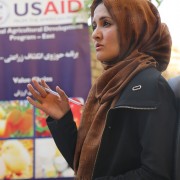Speeches Shim

Despite international law, civilians still often pay the price for war. This can be particularly difficult on families when they lose their main breadwinner, affecting the livelihood of the entire family. That’s why USAID has a program specifically to assist Afghans negatively impacted by the conflict.

After two years of study, Tabasom Hasib gained her Physiotherapy degree, but lacked the confidence to pursue a job in this field. Her courses focused heavily on theory and provided little practical, real world training.

Zarifa Rezaee started her company selling homemade tomato paste, chutney, and pickles made with fresh ingredients from women farmers in her village. The company was doing well, so she employed seven additional women – all struggling with poverty and most either widows or students. Despite her early success, she faced cultural norms that created obstacles for businesswomen, especially women in rural areas. “From the outset I kept meeting with resistance toward women professionals,” Zarifa says, “but I fought every single battle along the way and never gave up.”

The USAID Capacity Building Activity Project (CBA) promotes civil society engagement with local government and oversight of education services. In July 2019, USAID-trained community education monitors (CEMs) in Kandahar Province inspected the construction of the Ghazi Mohammad Akbar Khan High School and determined that the contractor was using substandard construction materials and that the construction laborers had not been hired from the local village, as required by the construction contract. The CEMs raised the issue with the district education department and the district governor, whom responded by initiating an independent review of the construction work and establishing a joint committee of community elders and education monitors to oversee and assess the school construction work.

Apricot processors in Afghanistan are struggling for their share of an Afghan market saturated with imported apricot juices, jams, and fruit concentrates. To enhance competitiveness, Afghan agribusinesses need to improve their product quality, shelf life, and marketing approach. This depends less on state-of-the-art equipment as on processors’ essential skills, knowledge, and know-how.

Comment
Make a general inquiry or suggest an improvement.